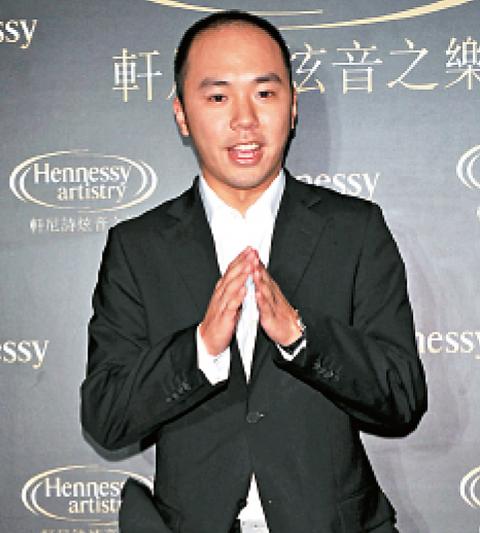Justin Lee (李宗瑞), who is wanted by prosecutors for allegedly raping a woman and filming bedroom trysts with a number of celebrities and models, turned himself in last night.
Accompanied by three lawyers, Lee showed up at the Taipei District Prosecutors’ Office at 8:30pm. A woman surnamed Chen (陳), who allegedly assisted Lee while he was on the run, also turned herself in in Taichung, prosecutors said.
Prosecutors said they received a call from Lee’s lawyer at around 4pm informing them that his client would turn himself in that evening.

Photo: Taipei Times
At press time, Lee was still being questioned by prosecutors.
The Taipei District Prosecutors’ Office on Aug. 1 issued a wanted notice for Lee after discovering that he had vacated his residence and could not be contacted.
Prosecutors began pursuing the case in July last year, when a pair of twin sisters accused Lee of drugging and raping the elder sister and filming the process.
The case has attracted widespread attention after investigators said there could be more than 40 victims, including showbiz performers, models and A-list actresses.
The scandal sparked a media frenzy because Lee is the son of Lee Yueh-tsang (李岳蒼), a board member of Yuanta Financial Holding Co (元大金控). Lee Yueh-tsang on Monday last week resigned from the company, reportedly because of the scandal.

NATIONAL SECURITY THREAT: An official said that Guan Guan’s comments had gone beyond the threshold of free speech, as she advocated for the destruction of the ROC China-born media influencer Guan Guan’s (關關) residency permit has been revoked for repeatedly posting pro-China content that threatens national security, the National Immigration Agency said yesterday. Guan Guan has said many controversial things in her videos posted to Douyin (抖音), including “the red flag will soon be painted all over Taiwan” and “Taiwan is an inseparable part of China,” while expressing hope for expedited “reunification.” The agency received multiple reports alleging that Guan Guan had advocated for armed reunification last year. After investigating, the agency last month issued a notice requiring her to appear and account for her actions. Guan Guan appeared as required,

A Vietnamese migrant worker yesterday won NT$12 million (US$379,627) on a Lunar New Year scratch card in Kaohsiung as part of Taiwan Lottery Co’s (台灣彩券) “NT$12 Million Grand Fortune” (1200萬大吉利) game. The man was the first top-prize winner of the new game launched on Jan. 6 to mark the Lunar New Year. Three Vietnamese migrant workers visited a Taiwan Lottery shop on Xinyue Street in Kaohsiung’s Gangshan District (崗山), a store representative said. The player bought multiple tickets and, after winning nothing, held the final lottery ticket in one hand and rubbed the store’s statue of the Maitreya Buddha’s belly with the other,

‘NATO-PLUS’: ‘Our strategic partners in the Indo-Pacific are facing increasing aggression by the Chinese Communist Party,’ US Representative Rob Wittman said The US House of Representatives on Monday released its version of the Consolidated Appropriations Act, which includes US$1.15 billion to support security cooperation with Taiwan. The omnibus act, covering US$1.2 trillion of spending, allocates US$1 billion for the Taiwan Security Cooperation Initiative, as well as US$150 million for the replacement of defense articles and reimbursement of defense services provided to Taiwan. The fund allocations were based on the US National Defense Authorization Act for fiscal 2026 that was passed by the US Congress last month and authorized up to US$1 billion to the US Defense Security Cooperation Agency in support of the

CLASSIFIED BRIEFING: The ministry said the special budget focuses on building a comprehensive defense system and strengthening the domestic defense industry The Ministry of National Defense yesterday released information on seven categories of weapons systems to be procured under a stalled NT$1.25 trillion (US$39.57 billion) special defense budget, including precision artillery, long-range missiles, air defense anti-tank missiles and more than 200,000 uncrewed aerial vehicles (UAVs). The Executive Yuan approved a draft version of the budget on Nov. 27 last year and submitted it to the legislature for review. The legislature’s Foreign Affairs and National Defense Committee yesterday invited Minister of National Defense Wellington Koo (顧立雄) to deliver a classified briefing and answer questions at a closed-door session. Koo said he hoped to provide lawmakers